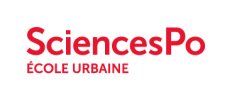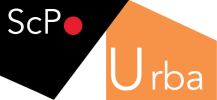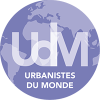Portrait
When the administration is transformed | Magali, STU class 2011
Posted on | Alumni Portrait
Magali ended her academic career, which she completed entirely at Sciences Po, with an internship at SAMOA (the development company for the Ile de Nantes urban project). She is in charge of organising the "Metropolitan Conference", an annual event that brings together the actors of the Nantes/Saint-Nazaire metropolis and gives them the opportunity to reaffirm their desire to build the future of their territory together. For this fifth edition, the Conference is particularly interested in local prospective approaches. From the beginning, Magali has specialised in governance issues, and this first one-year experience has allowed her to refine her knowledge of the functioning of metropolitan territorial eco-systems.
As her mission was coming to an end, Magali was invited by the 27th Region, which was launching its La Transfo programme in the Pays de la Loire Region at the time, to present the panorama of foresight initiatives underway in the region. Several fortunate connections were made at that time, as her exchanges with a classmate who works on foresight issues for the 27th Region and her meeting with Romain Thévenet, co-founder of the 27th Region, offered her the opportunity to collaborate with this structure, part-time and under the status of self-employed at first. In January 2013, she finally joined the association's permanent team as a development officer, working closely with Stéphane Vincent, the general delegate.
To understand Magali's journey, you need to understand the role of the 27th Region, a unique public transformation laboratory. Initiated by the FING (Fondation Internet Nouvelle Génération) in 2008, the association was born as a sort of innovation laboratory for the ARF (Association des Régions de France), to imagine how an "ideal region" would function. In concrete terms, the 27th Region is testing new ways of designing public policies, thanks in particular to service design methods.
Why design? For Magali, design provides conception and modelling tools that make it possible to put the question of use at the heart of public systems and facilitate experimentation, fundamental characteristics for innovating in public action. The 27th Region is not a structure outside the ground but rather a do-tank whose programmes are concretely in line with the policies of the member Regions with which it works to change their modes of action. The 27th Region is inspired by multiple cultural influences such as service design, the free and open-source culture, social innovation, popular education movements, etc. Its approach generally runs counter to the solutions provided by large consultancies, to which public administrations have too often tended to delegate "grey matter" and strategic thinking, at the cost of growing discomfort among staff. On the contrary, the challenge of the 27th Region is to show that the public administration is capable of renewing itself, that it has the resources and the creative potential. In a context where the RGPP and the new public management seem to have weakened its capacity for action, the experiments proposed by the 27th Region highlight innovations where they are often not expected!
Within this structure, Magali plays an important coordinating role through her position as project manager. Her missions are very much about human contact, as she coordinates the teams of "residents" who carry out the programmes and participates in the development of the resulting experiments.
- She spends a lot of time in the field, with the teams and partners, or on Skype, talking to the teams and "taking the pulse" of the projects, but also with the delegate general, who has a representative role and must be constantly aware of the work in progress. His work therefore requires a thorough understanding of the political issues and human skills.
- The other part of his work consists of working on the development of the association's new projects, including RE-ACTEUR PUBLIC, a new programme involving the State and local authorities to invent a new culture for public action.
With this type of mission and projects spread throughout France, this position requires a particularly high level of investment, implying a constant tension in her work which can sometimes prove tiring... and in the end quite similar to the rhythm of consultants! Although Magali has taken some time to find her place and sometimes finds it difficult to assume the position of "permanent research" that it implies, she is happy to work for an organisation that defends values and "ways of doing things" that correspond to her.
Magali's advice
Do not devalue "coordination" functions. With our profiles, we often find ourselves in "super-coordinator/project manager" roles, which can sometimes be seen as superfluous, not essential or not concrete enough, or even frustrating. But this "interface" position is in fact essential, so it must be appreciated at its true value. Going into experiences where we are led to confront our practices with other skills and other profiles is always extremely enriching, even if it is not always very comfortable at the beginning. The advantage of our profiles is that we adapt quite well to quite different contexts, so don't hesitate to follow our desires and explore other fields that we like!
The Greater Paris, a question of territorial strategy
Posted on December 04, 2014
In November, In Situ went to meet Lisa, a 2009 graduate of the Master's degree in Territorial and Urban Strategies, who is currently in charge of International…
Laurie-Mai DENOUX - STU class of 2010
Posted on September 11, 2014
Laurie-Mai is a former student of the Master Stratégies Territoriales et Urbaines and is now in charge of supporting local authorities in the definition and fi…
 English
English  Français
Français 




